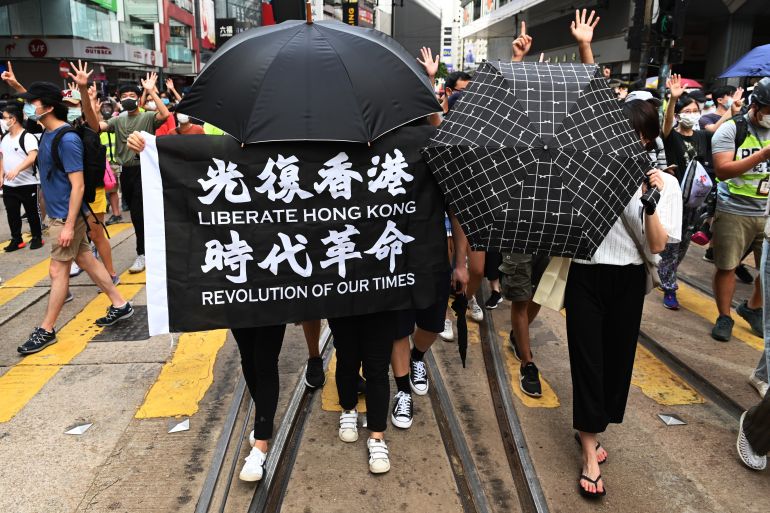Hong Kong man on national security trial over protest chants
Food delivery worker who has been in custody for 10 months, accused of inciting secession from China for chants.

A man who chanted protest slogans has pleaded not guilty to inciting secession in the second national security case to come to trial in Hong Kong.
Ma Chun-man said on Tuesday that he was innocent of the charge.
Keep reading
list of 4 itemsSnacks, books for prisoners spark Hong Kong security law arrests
Hong Kong few select powerful new ‘patriots only’ committee
Protesters hauled away from Evergrande HQ as meltdown fears mount
Beijing imposed the national security law in June last year after enormous, sometimes violent, democracy protests swept the Chinese-controlled territory in 2019.
The law punishes actions that China deems secession, subversion, collusion or “terrorism’ with as long as a life sentence.
While the authorities said the legislation would only affect a tiny number of people, its imposition has led to the dissolution of the pro-democracy bloc in Hong Kong’s mini parliament, an exodus of politicians and activists and the winding up of some of the territory’s oldest unions and civil society groups.
The first national security trial concluded in July when a man was convicted of terrorism and secession after he rode his motorbike into police while flying a protest flag with the slogan “Liberate Hong Kong, revolution of our times”.
Ma, a 31-year-old former food delivery driver, is accused of trying to separate Hong Kong from China by chanting slogans on more than a dozen different occasions between August and November last year.
Most of those charged under the national security law are denied bail and Ma has been in custody since his arrest 10 months ago. He faces as many as seven years in prison if convicted.
Prosecutors said the slogans Ma used that incited secession included “Liberate Hong Kong, revolution of our times”, “Hong Kong independence, the only way out”, “Hong Kongers, build our own country”, “One nation, one Hong Kong” and “All shall be valiant, start armed uprising”.
In the July trial, national security judges previously ruled that “Liberate Hong Kong, revolution of our times”, a popular protest slogan, was secessionist.
Ma had made clear he intended the challenge the security law and had called for others to protest against its implementation, prosecutors said.
“The Basic Law provides freedom of speech for Hong Kong people,” he said at one of the rallies before his arrest, referencing the city’s mini-constitution.
In another interview, he said his definition of “revolution” meant for Hong Kong people to regain sovereignty and achieve the right to elect their own leaders by universal suffrage.
China said the security law was needed to return stability to Hong Kong after the democracy protests, but it has radically reshaped its political, cultural and legal landscape.
More than 70 people, including many of the city’s most prominent democracy activists, have since been charged under the law, almost all for holding political views now deemed illegal.